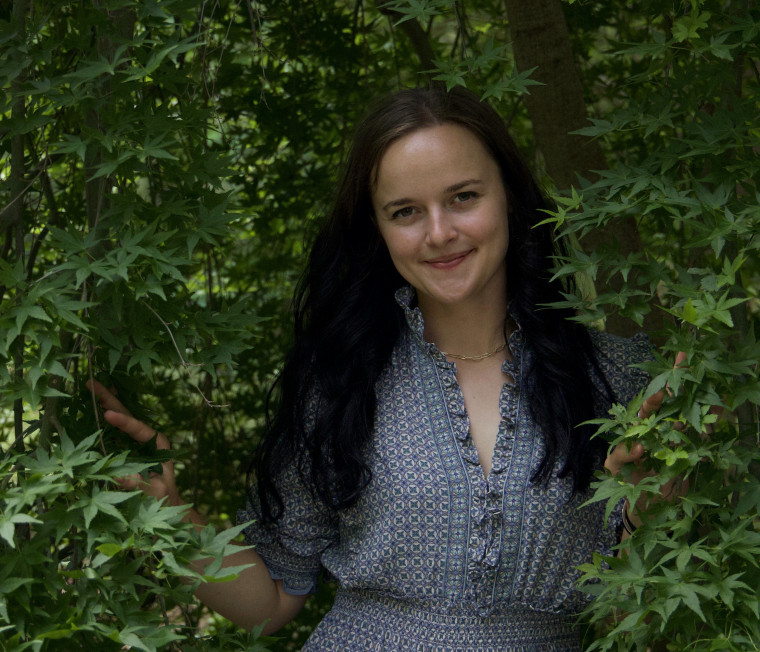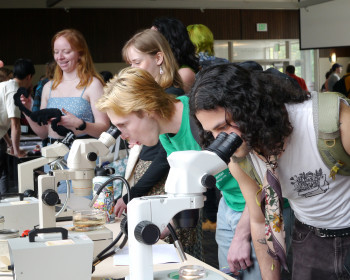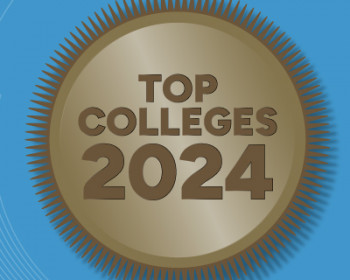Hanna Varga
The beauty of Lewis & Clark’s campus is undeniable—passing through the pedestrian bridge above the forest on my way to campus got me excited even for those early morning classes.

Degree and Class Year
Hometown
Current City
Major
Extracurriculars
Job Title, Organization
Continuing Studies
What three words would you use to describe L&C?
What made you want to come to Lewis & Clark?
The location. I understand it may not be the most important factor for most people, but it does matter where you choose to spend ~4 years of your life. As an avid hiker and nature lover, it was crucial for me to study at a place where I could retreat to the forest for a walk in-between classes, and balance out all the mental exercise with some hiking on weekends (or with one of the exciting trips offered by College Outdoors). At the same time, downtown Portland is a short bus ride away, so I could easily get groceries, visit museums, or attend concerts. The beauty of Lewis & Clark’s campus is undeniable—passing through the pedestrian bridge above the forest on my way to campus got me excited even for those early morning classes.
What have you been doing since graduation?
Completing a senior honors thesis project made me realize how much I enjoy research, so I decided to pursue a PhD, which kept me busy for the past five years. I knew I wanted to work on challenges that are directly applicable to the environment, so I completed most of the engineering prerequisite classes at Lewis & Clark, and eventually chose to join Dr. Mark Wiesner’s group in the environmental engineering department at Duke University. My research primarily focused on how the physicochemical characteristics of dust affect the reversibility of photovoltaic panel soiling.
How did Lewis & Clark prepare you for PhD program?
Following up on the previous point, the independent research I did for my senior thesis proved to be extremely valuable during my PhD, as it introduced me to skills such as project and time management, scientific writing, and in-depth data analysis, among others. Besides the obvious academic preparation, the interactive nature of many L&C classes also made me more comfortable in group discussions, as well as in meetings with my PhD advisors. In my opinion, one major benefit of attending a liberal arts college is that you are encouraged to take a variety of classes, where you may have to overcome initial discomfort due to unfamiliarity with the subject. I think this experience really helps when facing difficulties later on in one’s career, and also teaches you how to handle challenging tasks.
What would you say is the most important thing you learned at Lewis & Clark?
I learned to love learning.
Why did you major in chemistry?
I came to L&C with a focus on visual arts and biology first. My journey toward a chemistry major started when I took General Chemistry I with Associate Professor Barbara Balko, and realized that this subject just makes sense—it was logical, with formulas and laws in the classroom, and you could try out the concepts first-hand in the laboratory. Therefore, in sophomore year, I switched my major to biochemistry and molecular biology, moving all the way to the chemistry end of the spectrum in my junior year (again, a great advantage of liberal arts, allowing me to switch majors with ease). I loved the material, the experiments, the real-life applications, but most of all the phenomenal faculty and cohort I had.
How do you stay connected to Lewis & Clark as an alum?
Moving to the East Coast has severed my ties to Lewis & Clark, unfortunately, at least in the physical sense. I do try to keep in touch with my college friends and classmates, and hope to visit campus soon or attend a reunion. Until then, I have to resort to newsletters and online meetings to stay connected.
What was your favorite class? How did it expand your knowledge?
My favorite class was Calculus I with Assistant Professor With Term Sweta Suryanarayan, not because I particularly like mathematics, but because it was the most empowering class I have ever taken. Calculus I was the first and last math course I planned on taking in college, as I never considered myself to be “good” at math, and have always struggled to try to understand the subject. Once I was in Sweta’s class, it turned out that the problem was not with me, but with my previous teachers. Sweta’s approach—to my surprise—made every class engaging and fun, and she always made sure that everyone grasped the concepts through a variety of examples. Her class made me so confident in my numerical abilities that I was one class short of completing a minor in mathematics at the time of graduation.
More Admissions Stories
Admissions is located in Frank Manor House on the Undergraduate Campus.
MSC: 32
email admissions@lclark.edu
voice 503-768-7040
fax 503-768-7055
Vice President of Admissions and Financial Aid
Eric Staab
Admissions
Lewis & Clark
615 S. Palatine Hill Road MSC 32
Portland OR 97219

